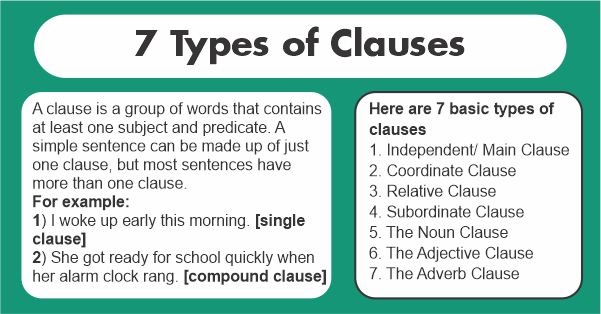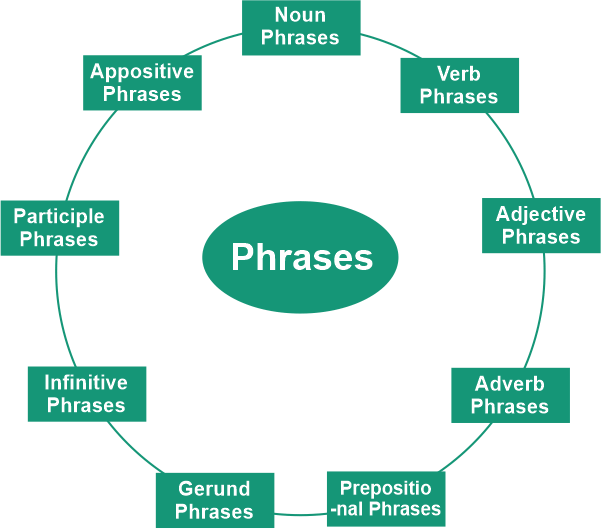Difference Between Phrase and ClauseA sentence in English can be broken into several sections. Each component of a sentence performs a unique purpose and has distinctive characteristics. While all of this appears to be straightforward, there is still a lot of ambiguity between the different components of a sentence. A clause and a phrase is one of the most perplexing pairs of utterances. 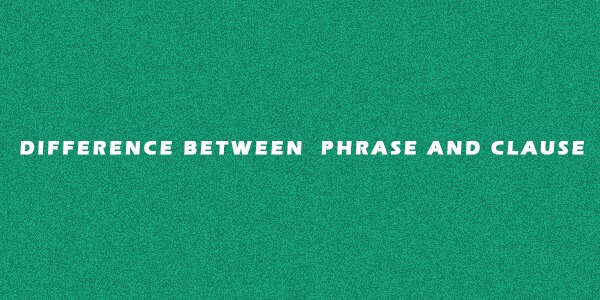
Clauses and phrases are two quite different components of a sentence, but their similarities make it challenging for English language learners to differentiate between the two. Although both phrases and clauses are significant collections of words that comprise sentences, clauses are entire thoughts that can operate on their own. Sentences thus contain a range of phrases and clauses. But what exactly is the distinction between phrases and clauses, and how can you know if you are using them correctly? Continue reading to learn how to tell the difference between a phrase and a clause for crafting a good sentence. Definition of Phrases and ClauseWhat Exactly Is a Phrase?A phrase is considered as a collection of words that may comprise sentence-building elements, such as the noun or the verbs, but do not include a subject (the one performing an activity in a sentence) and a predicate (which informs the reader about what the subject is doing). A phrase adds meaning to a statement by supplying more details about the subjects, objects, verbs, or situation. A statement is made up of phrases, yet isolating a phrase inside a sentence would not function as a full sentence. What Exactly Is a Clause?A clause is a sentence component that works independently or as a full thought. Clauses have a subject (the performer) and a verb (which is the action the subject performs). Sentences are composed of standalone and dependent statements that define a subject's location, emotion, and activity, etc. What Is the Difference Between Phrase and Clause?Every sentence is made up of clauses and/or phrases, but distinguishing between the two can be difficult and challenging at times. Both phrases and clauses are collections of two or more words that help us form sentences, but they have different purposes. To assist us in comprehending the distinction, we need to define them both separately first. A clause is a collection of words that includes the subjects and the verbs. A phrase is a set of words that lacks the subject and the verb. A sentence can appear as a single clause, but a sentence cannot be made up of a single phrase. Phrases contribute value to sentences but cannot produce them on their own. 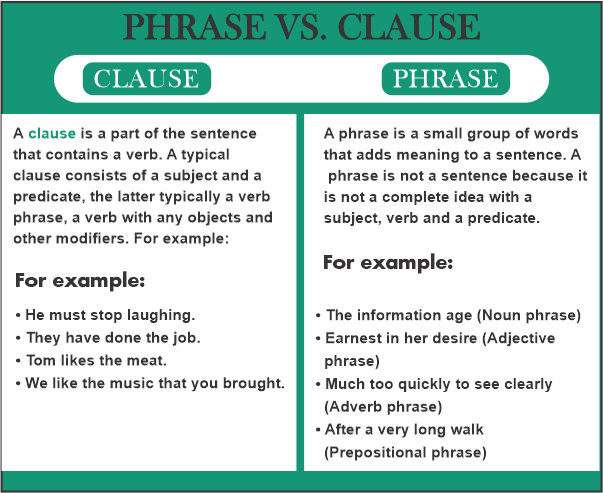
Clauses, on the contrary, are absolutely necessary. The removal of a clause from a sentence may influence the meaning and the comprehension of the sentence. Here's an instance of a sentence that incorporates both a phrase and a clause: Everywhere I go, she follows me. The phrase in the above sentence is 'Everywhere I go,' and the clause is 'she follows me.' 'Everywhere I go' does not make logical sense on its own; it is not a finished idea. She follows me,' on the other hand, comprises both a subject and a verb - 'she' and 'follows,' respectively. It's a full thought, and we don't need any additional words to comprehend the sentence's message. Examples Explaining the Difference Between Phrase and ClauseClause ExampleThe kid is dancing. Since the kid is the subject and dancing is the verb in the above simple phrase, the section kid is dancing is a clause since it contains both subject and verb. A clause may also have an object in addition to the subject, allowing it to exist alone as a coherent sentence. One of the simplest ways to tell the difference between a clause and a phrase is that a clause is a collection of words that makes perfect sense without the need for any more words to finish it. Sanya grinned. Consider the preceding example; you will note that this two-word short sentence makes perfect sense and is easily understood. It is a sentence since it has a subject and a verb, so it is a clause. As stated above, a single sentence may feature one clause, but a sentence may include more than one clause. Examples: I searched everywhere, but the kitty was nowhere. The preceding sentence comprises two clauses. I searched everywhere, but the kitty was nowhere. Similarly, lengthier and more complex sentences may contain more than two clauses. 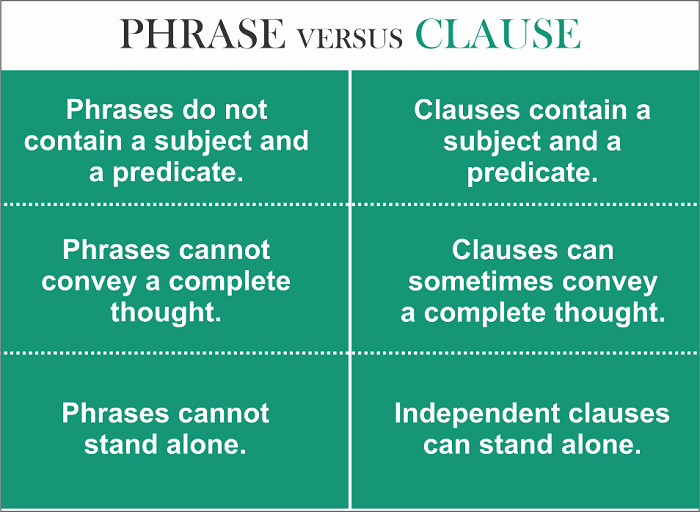
Phrase Examples A phrase is a set of words in a sentence that lacks the subject and the verb. In another sense, one part of a sentence having the subject and verb refers to the clause, whereas the remaining sentence without those two elements of speech is a phrase. Example: On the rock, in the lake, and beyond the distance. All of the instances above are fragments of sentences that lack a subject and verb. Hence, they are categorized as phrases. In a sentence, a clause and a phrase can coexist. As an example, John is enjoying in the playground. John is enjoying a clause (subject+verb) and in the playground is a phrase. Another simple distinction between phrases and clauses is that the phrases do not make perfect sense on their own and need the assistance of other words to form a complete sentence. Take the preceding example: if you discover it written anywhere in the field by itself, you will be quite perplexed about its meaning and will be unable to interpret it. Thus, a phrase is a group of words that do not constitute a complete and comprehensible sentence on their own. Relationship Between Phrase, Clause, and SentenceTogether with phrases and clauses, the interpretation of a "sentence" can be misunderstood. They all contribute to the creation of meaning, but defining the individual pieces is challenging. Remembering the building elements of a sentence is an easy method of recalling the distinction between a phrase and a clause. A clause is made up of phrases, and a sentence is made up of clauses. So, in order to construct a sentence, the building pieces would be as follows: phrase → clause → sentence. The gigantic clock → The gigantic clock struck → The gigantic clock struck at twelve o'clock. A phrase is a combination of words that cannot be used as a sentence on its own. It's an important aspect of the clause and the sentence as a whole. (It is the topic of it), yet it can't make sense the way it is. 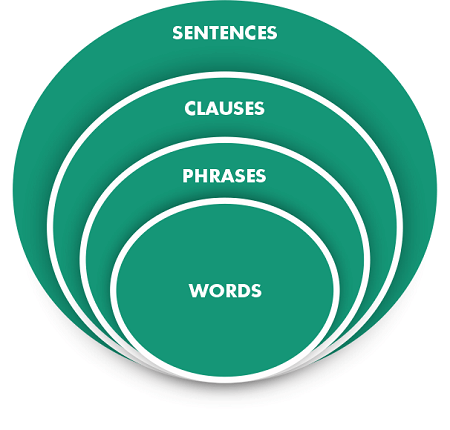
Things become a little more complicated with a main (or independent) clause. For instance, 'The gigantic clock struck' is both a clause and a sentence in its own right. It includes a subject and a verb. The final sentence is made up of phrases and clauses. This is what distinguishes it as a sentence. Simple, compound, complex, and compound-complex sentences are the four primary categories of sentences, each with a different amount of clauses and phrases. Remember that a phrase (whether basic or compound-complex) is a comprehensive notion that has been punctuated completely. It should begin with a capital letter and end with some form of punctuation, whether it's a full stop or a question mark or so on. How To Recognize A Phrase Or A Clause?Search for both a subject and a verb to determine whether the ensemble of words is a phrase or a clause. If you discover both, you have a clause. If you can only spot one of them, it's a phrase. Here's an easy example to consider: Dark and lychee dessert is scrumptious. The entire sentence is a clause (specifically, the main clause), yet a portion of the clause is a phrase. 'Dark and lychee dessert' does not have a verb; it is only the subject. That is, it is a sentence. However, there are numerous sorts of phrases and sentences, making differentiation difficult. It takes practice to figure out whether anything is a phrase or a clause. The easiest method to learn is to practice looking at the string of words and analyzing the various pieces to see whether they are phrases or clauses. 
Conversion of Phrases Into ClausesTransforming phrases into clauses is the first step toward creating a complete sentence.To make a phrase into a clause, you must first consider adding a subject and a verb to the phrase. Let's begin with a phrase, which is a collection of words that lacks a subject and a verb. There is no subject or verb in the phrase "in the village." This indicates that it is a sentence. We now require a subject to serve as the major emphasis of the clause. A statement's subject will be something like a person, location, animal, or item. Assume the subject of this clause is 'a herd of goats.' Finally, we must include a verb - an action that the 'herd of goats' will perform. We'll use the verb ''live" for this phrase. Let's combine them all: 'The herd of goats live in the village. ' This has resulted in the formation of a primary (or independent) clause. Once you've generated your clause, you must decide whether it's a primary clause or a subordinate clause - do you really need to add a second clause to have it make perfect sense? Remember this easy procedure for converting phrases to clauses: Phrase → add subject → add a verb. Now let us have a look at the various kinds of Clauses and Phrases Types of Clauses and PhrasesTypes of ClausesClauses can be classified into four types. In English grammatical constructs, four kinds of clauses are used. The four major types of clauses in English grammar are as follows.
Now let us have a look at different types of phrases. Different Types of PhrasesIn English grammar, there are many different sorts of sentences that fulfill various functions. Here are some examples of popular phrases.
These are some of the most common phrases. However, there are also an adjective and adverb phrases. ConclusionExploring and learning the difference between clauses and phrases is the initial move to grasp the diverse ways of writing the sentence and adopting the various styles. Once you get hold of this, you can move on and try different sentence styles!
Next TopicClause Examples
|
 For Videos Join Our Youtube Channel: Join Now
For Videos Join Our Youtube Channel: Join Now
Feedback
- Send your Feedback to [email protected]
Help Others, Please Share





